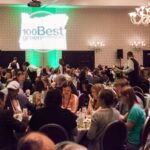In a state like Oregon, going green is not a new cause by any means. The Beaver State is a hub of alternative-vehicle interest, Portland’s public transportation and bike-friendliness are world-famous, and sustainable local products are the norm. So what else could the annual GoGreen Conference have to offer to attendees?
I checked out GoGreen 09 this week to find out. The event was at the Gerding Theater in Portland’s Pearl District — a small venue for the tremendous turnout the conference received. Crowds of businesspeople packed the lobby and milled around outside, representing companies such as Pacific Power, NW Natural and Providence Health & Services. And following its debut last month, Arcimoto’s brand-new Pulse EV was parked proudly in front of the theater (and Portland Mayor Sam Adams even stopped by to check it out again).
Not everyone was there representing business. I chatted with a recent MBA graduate from Dominican University of California who was attending the conference simply to get a sense of the way Portland approached sustainability issues. But with panel session topics ranging from green funding options to plan writing, the conference was clearly aimed at getting businesses of all stages started in the sustainability game.
BY KEVIN MANAHAN
In a state like Oregon, going green is not a new cause by any means. The Beaver State is a hub of alternative-vehicle interest, Portland’s public transportation and bike-friendliness are world-famous, and sustainable local products are the norm. So what else could the annual GoGreen Conference have to offer to attendees? What more did they want to know about? Collaboration and community seemed to be the two hot topics.
I checked out GoGreen 09 this week to find out. The event was at the Gerding Theater in Portland’s Pearl District — a small venue for the tremendous turnout the conference received. Crowds of businesspeople packed the lobby and milled around outside, representing companies such as Pacific Power, NW Natural and Providence Health & Services. And following its debut last month, Arcimoto’s brand-new Pulse EV was parked proudly in front of the theater (and Portland Mayor Sam Adams even stopped by to check it out again).
Not everyone was there representing business. I chatted with a recent MBA graduate from Dominican University of California who was attending the conference simply to get a sense of the way Portland approached sustainability issues. But with panel session topics ranging from green funding options to plan writing, the conference was clearly aimed at getting businesses of all stages started in the sustainability game.
Through all the usual green talk about getting rid of gas-guzzlers and cutting down manufacturing emissions, the theme of sustainability collaboration was something that stood out throughout the day. In a panel discussion on the new sustainable business landscape, Darcy Winslow, founder of DSW Collective with 21 years of experience at Nike, used an example from Nike’s past to illustrate the need for collaboration. When the activewear company decided to switch to water-based compounds in its products (because of the health risks organic compounds posed), it came across a problem: Even though Nike successfully came up with the technology to make the switch, its products were running down the same factory lines as Adidas and Reebok. The solution? Nike shared its technology with its rivals, at no cost. “Had we just implemented that on our product, we would not have solved the problem because you still have the volatile organic compounds coming from the other lines,” Winslow said. “So it was our first real initiative at collaborating with our competition.”
During the lunch break, I happened to sit with Dan Weldon, manager of Umpqua Bank’s eco-banking division and also a speaker at the conference. I asked him if there was anything new that attendees were interested in, and he echoed the same emphasis on collaboration over competition, a message he heard consistently at the conference.
But on top of that, Weldon said there was another focus taking shape. “I think one of the primary messages we’re hearing is community-building instead of looking at sustainability as strictly an energy and expense issue,” Weldon said. “We get so tied into winning customers and winning accounts, and I think something we’re hearing here is that our focus needs to be broader. Our focus needs to be on building an authentic story of how we’re benefiting our communities and creating opportunity.”
Like sustainability, the concepts of collaboration and community are nothing new to us, either; they’re values that are taught beginning in grade school. But they’re coming into play again in a much bigger way. How businesses work together on environmental issues and expand their focus on people and the planet will play a critical role in our future.
“If we all fell off the planet, nature would be fine,” said panelist Sheri Flies of Costco Wholesale Corporation. “But if nature falls off the planet, we’re doomed.”



